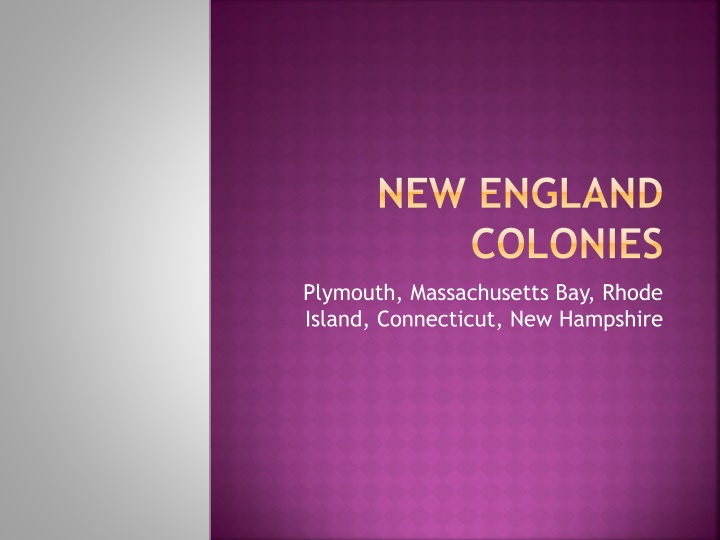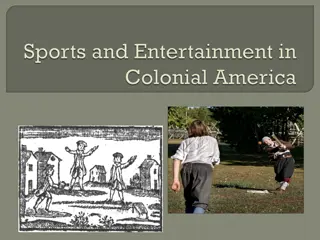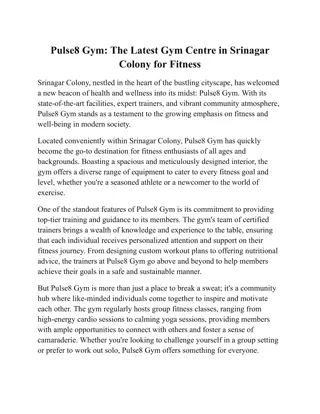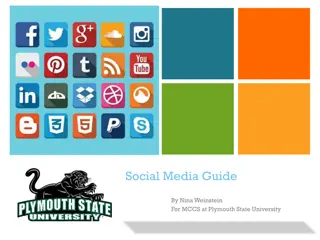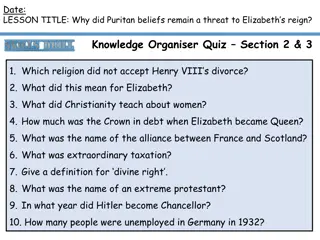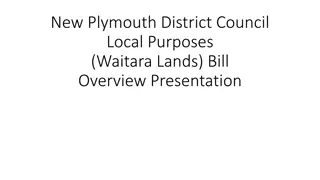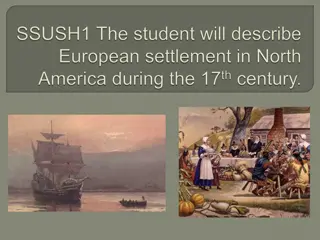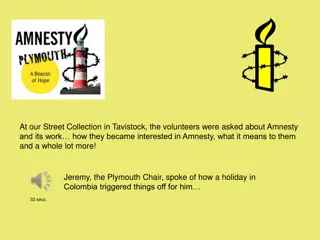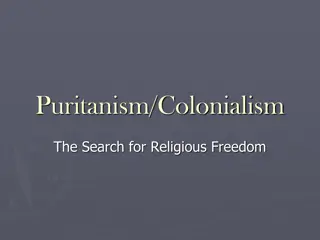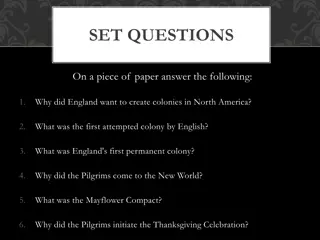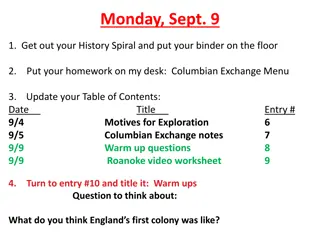The Story of New England Colonies: Pilgrims, Puritans, and Plymouth Colony
Explore the history of the New England colonies including Plymouth, Massachusetts Bay, Rhode Island, Connecticut, and New Hampshire. Discover the impact of geography on their development, the differences between Pilgrims and Puritans, and the founding of Plymouth Colony by the Pilgrims led by William Bradford. Learn about the Mayflower Compact, the challenges faced by the Pilgrims, and their interactions with the Wampanoags.
Download Presentation

Please find below an Image/Link to download the presentation.
The content on the website is provided AS IS for your information and personal use only. It may not be sold, licensed, or shared on other websites without obtaining consent from the author.If you encounter any issues during the download, it is possible that the publisher has removed the file from their server.
You are allowed to download the files provided on this website for personal or commercial use, subject to the condition that they are used lawfully. All files are the property of their respective owners.
The content on the website is provided AS IS for your information and personal use only. It may not be sold, licensed, or shared on other websites without obtaining consent from the author.
E N D
Presentation Transcript
NEW ENGLAND COLONIES Plymouth, Massachusetts Bay, Rhode Island, Connecticut, New Hampshire
INTRO TO NEW ENGLAND COLONIES http://www.history.com/topics/plymouth
THINK BACK How will geography impact the development of the New England colonies? How will this differ from the development of the Southern Colonies?
PILGRIMS VS. PURITANS Pilgrims and Puritans made their way over to New England but what is the difference between these two groups? http://www.history.com/topics/plymouth/vi deos/puritans-vs-pilgrims
PURITANS VS. PILGRIMS Puritans want to purify the Church of England Pilgrims Separatists want to completely separate themselves from the Church of England
PLYMOUTH COLONY Pilgrims Wanted to build Christian commonwealth In 1620 led by William Bradford crammed into the Mayflower for the New World 102 men, women, and children - Pilgrim saints Christians recognized as being elected for salvation non Pilgrim strangers ordinary settlers, hired hands, and indentured servants http://www.history.com/topics/plymouth/vi deos/pilgrims-in-america
MAYFLOWER COMPACT 41 of the Pilgrims entered into a formal agreement to abide by the laws made by the leaders of their own choosing Used later as a model for New England settlers; helped establish American tradition of consensual government Civil govt came out of Church govt (Pass out Mayflower Compact)
PILGRIMS CONTINUED Nearly died of exposure and disease 1621 met Squanto Showed them how to grow maize By fall had corn, flourishing fur trade, and a supply of lumber for shipment To celebrate they had feast with Wampanoags (What holiday commemorates this today?) Population never rose above 7000
MASSACHUSETTS BAY Intended to be holy commonwealth King Charles I granted Massachusetts Bay Company an area north of Plymouth 1629 First this was a business venture Majority faction led by John Winthrop resolved to use colony for persecuted Puritans
JOHN WINTHROP Took advantage of omission of charter for Massachusetts Bay usually the company had to maintain its home office in England Winthrop took the charter with him and thereby transferred govt authority to Massachusetts Bay, where they hoped to ensure Puritan control
1630 17 ships of 1,000 colonists came to Massachusetts Boston became chief city and capital
GOVERNMENT Power rested with Massachusetts General Court Elected the governor and his assistants and consisted of shareholders, called freemen; few had this status 118 additional freemen in 1631
1644 2 house legislature developed Over 14 year period membership in Puritan church replaced the purchase of stock as means of coming a freemen (voter) General Court Representative body of 2 houses House of Assistants House of Deputies
RHODE ISLAND Founded by Roger Williams Purest of Puritans True Church could have no relations with English government; Anglican establishment No church was possible, unless perhaps one consisting of his wife and himself
ROGER WILLIAMS Purity of church required complete separation of church and state 1635 banished to England Aided by Narragansett Native Americans Bought land from NA and established Providence First town in America to legislate freedom of religion
RHODE ISLAND Refuge for dissenters who believed state had no right to coerce religious beliefs 1640 formed confederation 1643 secured first charter of incorporation as Providence Plantations Govt based on consent of the people
ANNE HUTCHINSON Believed ministers were hypocrites This went against Puritan beliefs Had meetings in her home to discuss sermons Went before general court in 1637 Gen Winthrop We do not mean to discourse with those of your sex
ANNE HUTCHINSON Claimed divine inspiration and was convicted Sought refuge in Portsmouth, south of Providence Moved to New York in 1642
CONNECTICUT Formed by groups of Massachusetts Puritans seeking better land and access to fur trade Thomas Hooker Organized self-governing colony in 1637 as response to the danger of attack from Pequot Indians 1639 CT adopted Fundamental Orders, series of laws providing for a govt Voting not limited to church members
NATIVE AMERICANS Region had 100,000 NA Settlers saw NA as an alien race and an impediment to spiritual and economic goals NA saw them as magical monsters Settlers goal was subordination of NA Initially NA helped white settlers developed flourishing trade (fur) 1610-1675 Abenakis declined from 12,000 to 3,000 Southern NE tribes 65,000 to 10,000
PEQUOT WAR 1636 settlers in MA accused a Pequot of murdering a colonist Burned Pequot huts and killed them Pequot chief attacked settlers 1637 Colonists and Narragansett allied killed 100s of Pequots Sold surviving Pequots to slavery in Bermuda Treaty of Hartford (1638) Pequot Nation dissolved
KING PHILIPS WAR NA had to live under English laws (like not hunting on Sabbath) Metacom Wampanoag chief Eng called him King Philip 1675 Burned and attacked settlements in NE Over a year of brutality Metacom died Displayed Metacom s head for 20 years 1/10 of colonial men died
SALEM WITCH TRIALS 1692 Started when teenage girls entranced by African tales told by Tituba Salem jail overflowed with accused Hysteria ran course 10 months later 19 people hanged; 100 jailed Almost all accused were women Most had defied traditional gender roles or had no husbands or brothers or sons http://www.history.com/topics/salem-witch- trials
